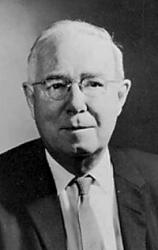- |
User Links
PERRY (Sowerby)

PERRY (Sowerby)
Composer: Leo Sowerby (1962)Published in 10 hymnals
Printable scores: PDF
Audio files: MIDI, Recording
Composer: Leo Sowerby
 Leo Sowerby (1895-1968) was born in Grand Rapids and studied at the American Conservatory of Music, Chicago (M.A. 1918). He served as regimental bandmaster with the 332nd Field Artillery Band in both England and France (1917-1919). He became the first fellow of the American Academy in Rome, where he studied for three years. He participated in the Salzburg Festival for Contemporary Music in 1923. From 1924 to 1963 he was on the faculty of the American Conservatory. He also was organist and choirmaster of St. James Church (1927-1963). Sowerby had an interest in folk music which he turned into wonderful compositions. He won a Pulitzer Prize for his Canticle of the Sun (1946). He died at Port Clinton, Ohio.
--Presbyterian Hymnal Comp… Go to person page >
Leo Sowerby (1895-1968) was born in Grand Rapids and studied at the American Conservatory of Music, Chicago (M.A. 1918). He served as regimental bandmaster with the 332nd Field Artillery Band in both England and France (1917-1919). He became the first fellow of the American Academy in Rome, where he studied for three years. He participated in the Salzburg Festival for Contemporary Music in 1923. From 1924 to 1963 he was on the faculty of the American Conservatory. He also was organist and choirmaster of St. James Church (1927-1963). Sowerby had an interest in folk music which he turned into wonderful compositions. He won a Pulitzer Prize for his Canticle of the Sun (1946). He died at Port Clinton, Ohio.
--Presbyterian Hymnal Comp… Go to person page >Tune Information
| Title: | PERRY (Sowerby) |
| Composer: | Leo Sowerby (1962) |
| Meter: | 8.6.8.6 |
| Incipit: | 17123 45336 5345 |
| Key: | E♭ Major |
| Copyright: | Music Copyright © 1964 by Abingdon Press. |
Texts
This Is the Spirit's Entry NowBeneath the forms of outward rite
Lord, Speak for Me, for I Am Yours
LORD, speak for me, for I am yours;
and test my mind and heart.
I walk with steady trust in you,
nor from your ways depart.
Alternative Tunes
Notes
Leo Sowerby (b. Grand Rapids, MI, 1895; d. Port Clinton, OH, 1968) composed PERRY in 1962 at Put-in-Bay, Ohio, the site of an international peace monument and the place from which Commodore Oliver H. Perry (then a lieutenant) sailed to gain a naval victory during the War of 1812. The tune was originally composed for James A. Blaisdell's "Beneath the Form of Outward Rite" and was first published in The Methodist Hymnal (1964). PERRY is composed in the style of Scottish psalm tunes, but it has a delightful alternation of 2/2 and 3/2 time. The accompaniment should be firm but subdued, but play the last stanza brighter.
Sowerby moved to Chicago at the age of fourteen to study with Calvin Lampert. In 1913 the Chicago Symphony gave the first public performance of his violin concerto. At the age of fifteen Sowerby decided to become an organist. He took some lessons, but because he found practice time on the organ too expensive, he sketched the pedal keyboard on brown butcher paper and laid the paper beneath the piano, thus teaching himself to play the organ. From 1921 to 1924 Sowerby studied at the American Academy in Rome as the first recipient of the "Prix de Rome." After his return to the United States he taught music at the American Conservatory in Chicago (1925-1962), was organist and choirmaster at St. James Episcopal Church there, and earned a doctorate in music from the Eastman School of Music in Rochester, New York. In 1962 he moved to Washington, D.C., to organize the College for Church Musicians at National Cathedral. A respected composer of numerous instrumental works and some three hundred songs, Sowerby received many commissions and awards, including the Pulitzer Prize in 1946 for his oratorio Canticle of the Sun, which has lyrics taken from the famous text by Francis of Assisi. A member of the joint commission that revised the Episcopal Hymnal 1940, Sowerby is known for his prolific output of organ works, choir anthems, and service music.
--Psalter Hymnal Handbook
Timeline
Arrangements
Harmonizations, Introductions, Descants, Intonations
|
Organ Solo
|
Media
Small Church Music #3395
- PDF Score (PDF)


 My Starred Hymns
My Starred Hymns



